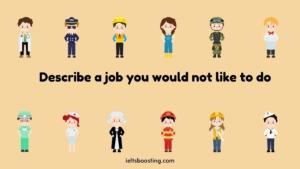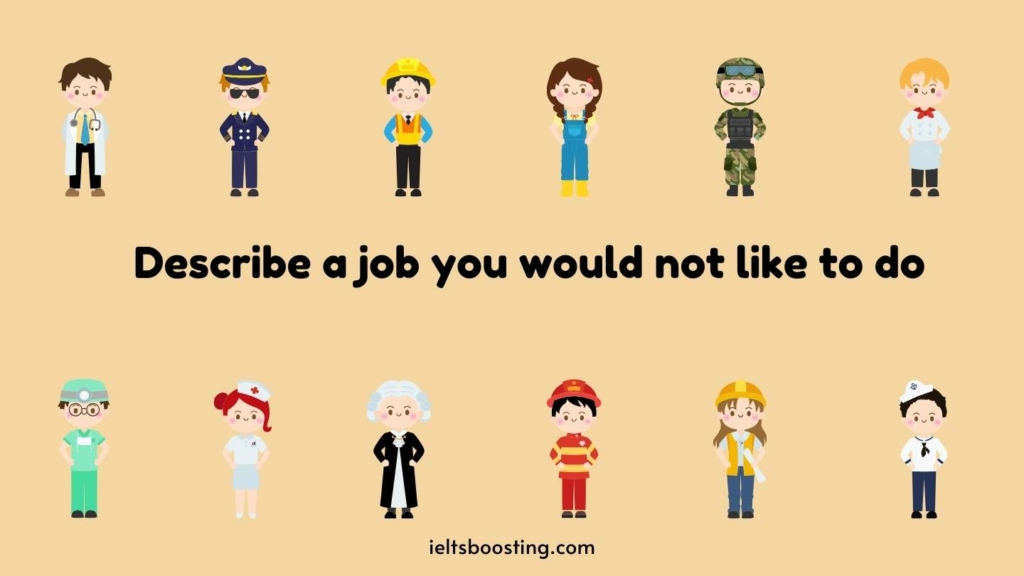Describe a job you would not like to do
You should say:
What the job is?
How you know about this job?
How easy or difficult the job is?
And explain why you would not like to do this job?
Sample answer to describe a job you would not like to do
Oh, let me tell you about a job I’d sprint away from faster than a cat from a bathtub – anything related to numbers, especially being an accountant. Now, don’t get me wrong; I totally respect those number-crunching wizards, but it’s just not my cup of tea.
I attempted to learn accounting after university graduation because some of my friends are accountants, and I heard that this job is well-paid. So, I gave it a try.
However, being an accountant demands a keen eye for detail to ensure accuracy in financial records, statements, and reports. The smallest mistake can have significant consequences. Additionally, a strong foundation in mathematics is essential for performing calculations and ensuring the accuracy of financial statements.
Despite my best efforts, I quickly realized that I’m not great with numbers. Dealing with them feels like navigating a minefield for me. Digits can be tricky, and I have this talent for occasionally making mistakes when I’m working with them. It’s like they play hide and seek on the computer, and I’m the one who’s always a bit lost. Messing up just one number, and everything in the financial world falls apart.
In conclusion, I just feel that this job isn’t cut out for me. The idea of being chained to a desk, constantly battling with numbers, is not my idea of a fulfilling career.
Forecast speaking from 1-4 2024

describe a job you would not like to do
Part 3 – describe a jobt you do not like to do
How do you think AI (artificial intelligene) will affect people’s work?
AI has an increasing effect on the way organizations do business and it is already impacting the workforce. Some routine jobs might get replaced by machines, Yet, AI also opens up new opportunities, especially in tech-related fields. However, it is unlikely that AI will completely replace the human workforce. AI is good at automating tasks that are repetitive, predictable, and rule-based. However, humans are still better at tasks that require creativity, empathy, and social intelligence.
- Routine jobs: Tasks that are regular, repetitive, and follow a predictable pattern.
- Job displacement: The phenomenon where workers lose their jobs due to various factors, including technological advancements.
- Tech-related fields: Areas of work or study connected to technology and its applications.
- Rule-based tasks: Activities that follow a set of predefined rules or instructions.
- Human workforce: The collective employees and workers comprising human labor.
- Creativity: The ability to generate novel ideas, solutions, or artistic expressions.
- Empathy: Understanding and sharing the feelings of others.
- Social intelligence: The capacity to navigate and understand social situations effectively.
What would you say are the important factors to consider when choosing a career?
There are many factors to consider when trying to determine the right career path. The first and most important thing to consider when choosing a career is your interests. For example, What are you passionate about? What makes you excited to wake up and start your day? Your career should be something that you enjoy and are interested in, otherwise you will likely become bored and unhappy with your job and work environment. Additionally, some other factors like job market trends and salary expectations also play important factors when choosing job as these factors influence your life in the long run
- Career Path: The progression or series of occupations that an individual might pursue throughout their working life.
- Interests: Personal likes or preferences that guide choices.
- Passionate: Having or showing a strong liking or enthusiasm for something.
- Enthusiasm: Intense and eager enjoyment or interest.
- Job Market Trends: The patterns and changes in job availability and types in the labor market.
- Salary Expectations: Anticipated amount of payment for work, usually expressed in annual terms.
- Influence: The capacity to have an effect on the character, development, or behavior of someone or something.
- Work Environment: The setting or conditions in which a person works, including physical and cultural aspects.
- Occupations: Jobs or professions.
- Progression: The process of developing or moving gradually towards a more advanced state.
That technology will make some people lose their jobs. How do you think this problem should be handled?
There are some possible solutions that could help mitigate this issue. One solution is to provide training and education programs to help workers acquire the skills needed for the jobs of the future. Invest in training programs to equip workers with the skills needed for jobs that AI cannot easily replace. Focus on skills such as critical thinking, problem-solving, creativity, emotional intelligence, and complex decision-making. In addition, other approaches, such as job creation and career counseling, may help those who have lost their jobs to find new career paths
- Mitigate: To make less severe, serious, or painful.
- Acquire: To buy or obtain for oneself.
- Equipping: Provide with the necessary items for a particular purpose.
- Artificial Intelligence (AI): The theory and development of computer systems able to perform tasks that normally require human intelligence.
- Critical Thinking: The objective analysis and evaluation of an issue in order to form a judgment.
- Problem-solving: The process of finding solutions to difficult or complex issues.
- Creativity: The use of imagination or original ideas to create something.
- Emotional Intelligence: The ability to understand, use, and manage your own emotions in positive ways.
- Complex Decision-Making: The process of making choices by identifying a decision, gathering information, and assessing alternative resolutions.
- Career Counseling: A service that provides guidance to people in choosing or changing careers.
Is it common in your country for people to move to other cities because of work?
In Vietnam, it’s quite common for people to move to other cities for work, especially among the younger generation. Many move from rural areas or smaller towns to bigger cities like Ho Chi Minh City or Hanoi. The reason is that these cities offer more job opportunities, especially in sectors like technology, finance, and services. For instance, a recent graduate might move to Ho Chi Minh City for a tech job or to start a business because the city is known as the economic hub of Vietnam

